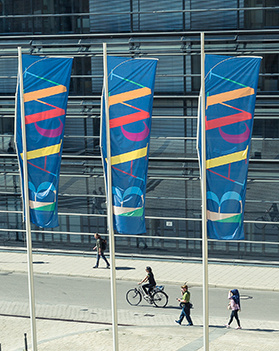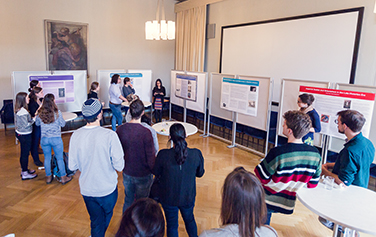A research hub
The Bavarian Academy of Sciences and Humanities conducts innovative basic research in the humanities and natural sciences through more than 60 different projects. Since it is not tied to any university, it can focus its efforts on long-term research endeavours. This includes work on scholarly dictionaries, important editions and series of exact measurements – all with the aim of preserving our cultural heritage and laying the foundations for further research. Many of the academy’s projects involve international collaboration. New ad-hoc working groups with a much shorter-term research horizon focus on highly topical social and political issues. With the Leibniz Supercomputing Centre and the Walther-Meißner-Institute for Low Temperature Research, the Bavarian Academy of Sciences and Humanities oversees two further institutes of international renown at the Garching research campus. Meanwhile, the Bavarian Research Institute for Digital Transformation (bidt) explores the impact of digitalisation on society.
A networking hub
As a community of scholars and a forum for interdisciplinary intellectual exchange, the academy provides world-class networking opportunities for top researchers. At the same time, it offers outstanding young scientists (supported by the Young Academy or “Junges Kolleg”) the chance to learn from their more experienced colleagues. In addition, the academy draws on its expertise to engage with political decision-making processes through its ad-hoc working groups, Technology Forum and Ecology Forum. Last but not least, the academy actively fosters its own international network. Through cooperations with organisations such as acatech (the German Academy of Science and Engineering), Deutsches Museum and the Bavarian State Library, it bundles scientific expertise and competencies across institutional boundaries and strengthens Bavaria’s standing as a centre of scientific excellence.
A support hub
In 2010, the academy established the Young Academy to support outstanding young scientists in Bavaria. Generous funding from the Bavarian State Ministry for Education and Culture, Science and Art has provided long-term financial security for this initiative. The ongoing process of developing the next generation of scientists does not begin at the postdoc stage, however, but rather at school and undergraduate level. The Digital Humanities department, for example, offers workshops and further training for students to develop their core digital skills. The Technology Forum runs a programme to raise interest in science research among school-goers. Finally, as part of the Young Researchers in Science (“Jugend forscht”) initiative, the academy awards special prizes enabling school children to gain insights into the world of research through workshops and excursions.
An information hub
The academy presents its scientific findings in various publication series and has been making these available free of charge since 2015 as part of its open-access strategy. Sharing information like this not only benefits scholars, who can use the findings for their own subsequent work, but also members of the general public with an interest in science. The academy organises colloquiums and conferences to facilitate dialogue between scientists from different disciplines. Public events provide an interface between the scientific community and the general public, thus enabling the academy to share its broad scientific expertise with society. Targeted at the general public, the magazine “Akademie Aktuell” (News Today) is published four times a year and contains news on research and events. The academy’s annual also gives regular insights into the work carried out over the previous year. On the digital side, as well as publishing information on its website, the academy has been active on social media since 2015. This provides a new platform for announcing information and for engaging in dialogue with our followers.





